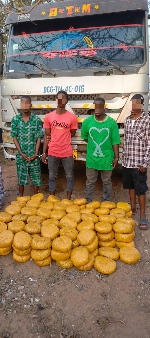Bono Regional Minister warns chiefs against shielding illegal miners
 The Regional Minister nad his enotourage greeting chiefs at the durbar
The Regional Minister nad his enotourage greeting chiefs at the durbar
The Bono Regional Minister, Joseph Addae Akwaboa, has cautioned traditional leaders in the Dormaa enclave not to lobby for the release of individuals arrested for illegal mining, popularly known as galamsey.
Speaking at a durbar of chiefs and people of Dormaa as part of his familiarisation visit to the Dormaa Municipal Assembly, the Minister stressed that such interventions weaken the government’s resolve to combat the menace.
He noted that illegal mining activities are escalating in communities such as Amasu, Aboabo, Akwamu, Wamfie, and Kyeremansu, and announced that security operations will now concentrate on the Dormaa Traditional Area.
Mr. Akwaboa pledged his commitment to restoring degraded forests, protecting water bodies, and safeguarding farmlands, warning that galamsey poses dire consequences for livelihoods, health, and the well-being of residents.
The Minister also highlighted key government initiatives, including the proposed 24-hour economy and ongoing road construction projects in the Bono Region.
Meanwhile, Dormaa Twafohene, Barimah Twumasi Bekoe, speaking on behalf of the Paramount Chief of Dormaa, Osagyefo Oseadeeyo Agyemang Badu II, reminded the government of a long-standing pledge by the late President John Evans Atta Mills to establish a university in Dormaa.
According to him, 2,000 acres of land have already been released for the project, and he appealed to President John Mahama to fulfil that promise.
The chief further called for compensation for farmers and landowners whose lands were taken over for the proposed university.
Touching on economic concerns, Barimah Twumasi Bekoe urged the government to provide urgent support to revamp the poultry industry, which he described as a key driver of employment for the youth.
He also appealed for improvements in health and educational infrastructure, as well as road networks, to ease transportation and facilitate the movement of farm produce.
Trending News

Ablakwa to open Gov't Accountability Series with focus on Foreign Affairs
02:40
Clash at St. Paul SHS: Arrests of final-year students spark community outcry
12:34
Mpraeso MP calls for gov't to pause AT–Telecel merger
09:17
Manso Nkwanta MP Demands justice over military brutality at Asanko Mines
09:58
Bringing smiles and hope: CMC MD engages with orphans in Ve-Deme In the Volta Region
00:34
Mahama to launch ‘Big Push’ infrastructure programme in Ho on Tuesday
02:35
Tema Police arraigned four over 315 parcels of suspected Indian Hemp
14:23
Three Nigerian nationals jailed for vehicle theft in Kumasi
16:17
Minority labels Abronye's arrest, arraignment as political persecution
12:01
Police announce arrest, further arraignment of Abronye over 'offensive conduct conducive to breach of peace'
00:34



